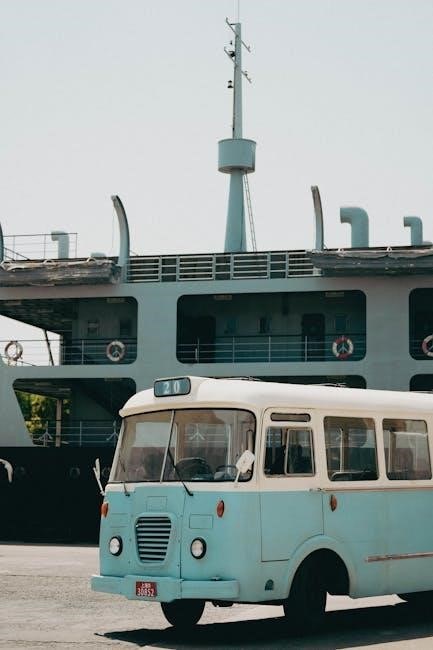Livery must instruct renters on safety procedures and protocols, including emergency contact information and proper vessel operation, as outlined in the pre-rental and pre-ride instruction checklist and guidelines.
Livery Operator Permit Requirement
To operate a livery, the owner must obtain a state-issued permit, which is typically provided at no cost. This permit requires the livery to adhere to specific guidelines and regulations, including the provision of pre-rental and pre-ride instructions to renters. The instructions must cover essential safety information, such as emergency procedures and vessel operation. Additionally, the livery must ensure that renters understand their responsibilities and obligations while using the vessel. The permit requirement is in place to ensure that livery operators prioritize the safety and well-being of their renters. By obtaining the permit, livery owners demonstrate their commitment to providing a safe and enjoyable experience for their customers. The permit is usually issued by the state’s relevant authority, and its requirements may vary depending on the location and type of vessel being rented. Overall, the livery operator permit requirement is an essential aspect of the livery industry.

Pre-Rental Safety Instructions
Livery must instruct renters on safety procedures, emergency contacts, and vessel operation guidelines prior to rental, as outlined in the pre-rental instruction checklist and guidelines online.
Florida Bookings Affected by SB606
For Florida bookings, livery operators must ensure that renters are aware of specific regulations and guidelines. According to the rules, renters are required to read and understand the pre-rental safety instructions before renting a vessel. This is a crucial step in ensuring that renters are aware of their responsibilities and the safety protocols in place. The livery operator must provide the renter with a copy of the pre-rental safety instructions and ensure that they understand the contents. The instructions must include information on emergency procedures, vessel operation, and safety equipment. By following these guidelines, livery operators can ensure that their renters are well-informed and safe on the water. The rules and regulations are in place to protect both the renter and the livery operator, and it is essential that they are followed carefully. Livery operators must also keep a record of the pre-rental safety instructions provided to each renter.

Written Agreement
Livery must have a written agreement with renters including name, address, and emergency contact information, as per guidelines and regulations.
Renter Lessee Information
The livery must obtain certain information from the renter or lessee, including their name, address, and date of birth, as well as emergency contact information. This information is necessary to ensure that the livery can contact the renter or lessee in case of an emergency. The livery must also verify the renter or lessee’s identity and ensure that they are authorized to rent the vessel. The renter or lessee must provide proof of age and residency, and must sign a written agreement outlining the terms and conditions of the rental. The livery must keep a record of all renter or lessee information, including the rental agreement and any other relevant documents. This information is used to ensure that the renter or lessee is aware of their responsibilities and obligations, and to protect the livery in case of any disputes or accidents. The livery must also ensure that the renter or lessee is aware of their rights and responsibilities under the rental agreement.
Operator Responsibility
Operators are responsible for collecting waste and maintaining vessels, ensuring safety protocols are followed, and providing instruction to renters on vessel operation and emergency procedures daily.
Collecting Waste
Collecting waste is a crucial aspect of livery operations, with a requirement of 5 barrows of poo to be collected per horse or pony per week, from Friday to Thursday.
This collected waste must be properly disposed of and recorded on the livery’s Facebook page on the days it has been collected, ensuring transparency and accountability.
The livery operator is responsible for overseeing this process and ensuring that it is carried out in a timely and efficient manner.
The collection and disposal of waste is essential for maintaining a clean and healthy environment for the horses and ponies, as well as for the people who interact with them.
By prioritizing waste collection, livery operators can help prevent the spread of disease and maintain a high standard of animal welfare.
The livery’s waste management practices are an important part of its overall operations and must be carefully managed to ensure the health and well-being of the animals in its care.

Livery Pre-Rental and Pre-Ride Instruction Checklist
Livery operators must provide renters with a checklist of instructions before rental and ride, including safety protocols and vessel operation guidelines and emergency procedures always.
Checklist and Attestation
The checklist and attestation process is a critical component of the livery instruction process, ensuring that renters have received and understood the necessary safety information and protocols.
The livery operator must provide a comprehensive checklist of instructions, which the renter must review and attest to before renting or riding a vessel.
This checklist should include items such as safety procedures, emergency contact information, and proper vessel operation guidelines.
The attestation process provides a record that the renter has received and understood the necessary information, which can help to minimize the risk of accidents and injuries.
By following this process, livery operators can help to ensure a safe and enjoyable experience for their renters, while also protecting themselves from potential liability.
The checklist and attestation process is an important part of the livery instruction process and should be taken seriously by all livery operators.
This process helps to promote safety and responsible vessel operation.

Proposed Rule Amendments
The proposed rule amendments aim to modify the existing livery pre-ride and pre-rental instructions to enhance safety and responsible vessel operation.
These amendments will impact livery operators who offer vessels for lease or rent, requiring them to provide updated instructions to their renters.
The proposed changes will focus on improving the clarity and effectiveness of the pre-rental and pre-ride instructions, ensuring that renters are well-informed and prepared for safe vessel operation.
The amendments will also take into account feedback from livery operators, renters, and other stakeholders to ensure that the new rules are practical and effective.
By updating the livery pre-ride and pre-rental instructions, the proposed rule amendments will help to promote a safer and more responsible vessel rental experience.
The amendments are expected to be implemented in the near future, and livery operators should be prepared to adapt to the new requirements.
Overall, the proposed rule amendments will play a crucial role in enhancing the safety and quality of the livery rental experience.
Qualifications for Instructors
Instructors providing pre-rental and pre-ride instructions must meet specific qualifications to ensure they can effectively teach renters about safe vessel operation.
These qualifications include completing a training program or having relevant experience in vessel operation and safety.
The instructors should be knowledgeable about the vessels being rented and the local waterways.
They should also be able to communicate effectively with renters and provide clear instructions.
Additionally, instructors may be required to have a certification or license to teach vessel operation and safety.
The qualifications for instructors may vary depending on the type of vessel and the location of the livery.
Overall, the goal of the instructor qualifications is to ensure that renters receive high-quality instruction and are well-prepared for safe vessel operation.
The instructor qualifications are an important aspect of the livery rental experience and help to promote a culture of safety and responsibility.
